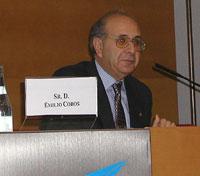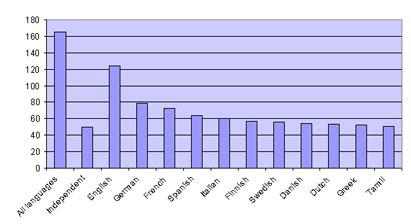Information and communication technologies
2002/11/20 Andonegi Beristain, Garazi - Elhuyar Zientziaren Komunikazioa
Science and Technology Week is celebrating its third day today. On this occasion, in which the information and communication technologies have been mentioned, Juan Gascón, director of ANIEL, José Antonio Maiz, member of the board of directors of quality of INTEL and Kepa Sarasola, professor of Language and Computer Systems of the UPV, among others, participated.

Start of the event J.R. Beloki has been appointed Deputy of Economics of the Basque Government. In his speech he talks about the need to take on the challenges of the European Union. It not only refers to the challenge of money to invest in R&D, but also to the creation of new companies and products, to the improvement of the capacity and quality of education, to the impulse of the information society, etc.
It emphasizes that to achieve this, we have to make a special effort, maintaining and improving the path so far. The Science and Technology Week, which concerns us, considers that it should be one of the ways to achieve these objectives, since it serves to socialize the difficulty of the challenge. And he has pointed out two key points to face the challenge: the first, you have to define what you want to achieve and how to do it, you have to decide the objectives. And secondly, it must be very clear that we are referring to the objectives that are to be achieved by means of solidarity, a common project, because otherwise they are not going to be achieved.
Telecommunications and electronics sector
We heard the first lecture by the mouth of Juan Gascón, director of Canovas Aniel Association. Aniel is an institution of the telecommunications and electronics industries. The conference presented the impact of telecommunications on our society, how the sector has changed, the problems it has and the possible solutions.

Mr. Gascón presents telecommunications as a productive factor and comments on the need for new organizations and studies aimed at them. In addition, it affirms that telecommunications is a strategic sector for the development of society.
It talks about changes in the sector and ensures that the development of telecommunications will mean a digital revolution. He adds that in the short term, with the speed of broadband connections and data transport capacity, new markets and businesses will be opened.
On the other hand, reference has been made to those responsible for the current crisis in the telecommunications and electronics sector, which has significantly decreased its investments. It says that real liberalization is pending execution and considers fundamental the need for investments.
Finally, he stressed the need to take advantage of adverse situations and put them ahead of the future, to be more competitive. It is not enough to live in the day to day of technology, you have to be innovative if you do not want to end up being a consumer of technology. Technology must be produced and, for this purpose, universities and companies must be aware of the importance of globalization and seek global leadership.
Nanotechnologies and the amazing world of silicon

Intel is a leading global company. José Antonio Maiz is co-director of the quality group of logical technologies manufactured in silicon. And this, in addition to mentioning Intel's latest advances, has exposed numerous examples of the influence of nanotechnologies on the design of computing and circuits.
In his speech, which has surprised everyone, he has exposed the ties between communication and the processing of information (computing), he has presented silicon as an engine of integration between both, referring to nanotechnologies and their effects.
As for the convergence of communication and computer science, he comments that currently or in the short term any person, wherever he is, must have access to any information. To do this, he mentioned that wireless networks and their developments will be a good tool.

As for silicon, he explained the capacity of the material. Presenting in figures its evolution as raw material of the computer components, it illustrates an area still without limits. In fact, in recent years the speed of computers has been growing exponentially, the number of operations per second has increased, the number of transistors and all thanks to silicon.
In the examples, the influence of nanotechnology and the importance of integration has been evident. The integration consists of joining in the same chip different circuits that perform different functions and extract every day new components of smaller size. To achieve them, it proposes to use three-dimensional transistors that are already investigating and control each atom.
Looking to the future, just as the human body develops under the orders of genetics, it has shown its dream of getting chips that would have some self-organization. This would mean a surplus of the expensive industrial processes used to obtain it. Many other discoveries that he presented showed that we still have a lot ahead; nanohilos, new carbon conductors, etc.
Jose Antonio Maiz and more information about his work are in the interview we did in the magazine Elhuyar.
Basque Country and Communication and Information Technologies
In his speech in Basque, Kepa Sarasola, professor of Language and Computer Systems of the UPV, spoke about Basque and ICTs.
The conference referred to the need to create a language industry, improve human relations, bring new products to the market and promote language-related ICTs.

In Euskal Herria, and more specifically in the case of Basque, there is still much work to be done, since of the applications available in other languages few are developed for the Basque language.
Among these applications are orthographic correctors, the possibility of conducting on-line queries in dictionaries, translators, internet search engines, applications that convert speech into text, applications capable of reading text, etc. without creating or in process of creation.
The challenge of creating these applications in Basque is no less, but Kepa Sarasola has shown optimism for our ability. For this purpose, it has defined collaboration as an essential tool, from which linguistic resources and applications are derived.
These applications, in addition to filling the current vacuum in the Basque world, should be, in Maizen's opinion, products aimed at multilingualism. In addition, it considers that the modularity of the generated applications is a very important feature, since in this way the applications can be used in different environments.

Gai honi buruzko eduki gehiago
Elhuyarrek garatutako teknologia





